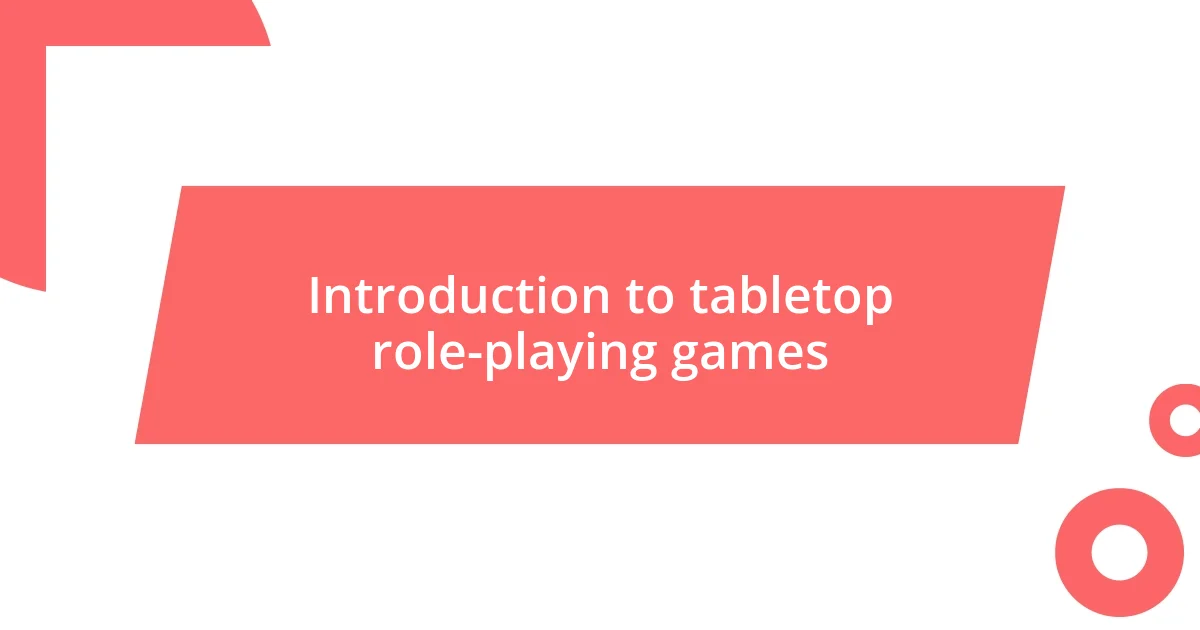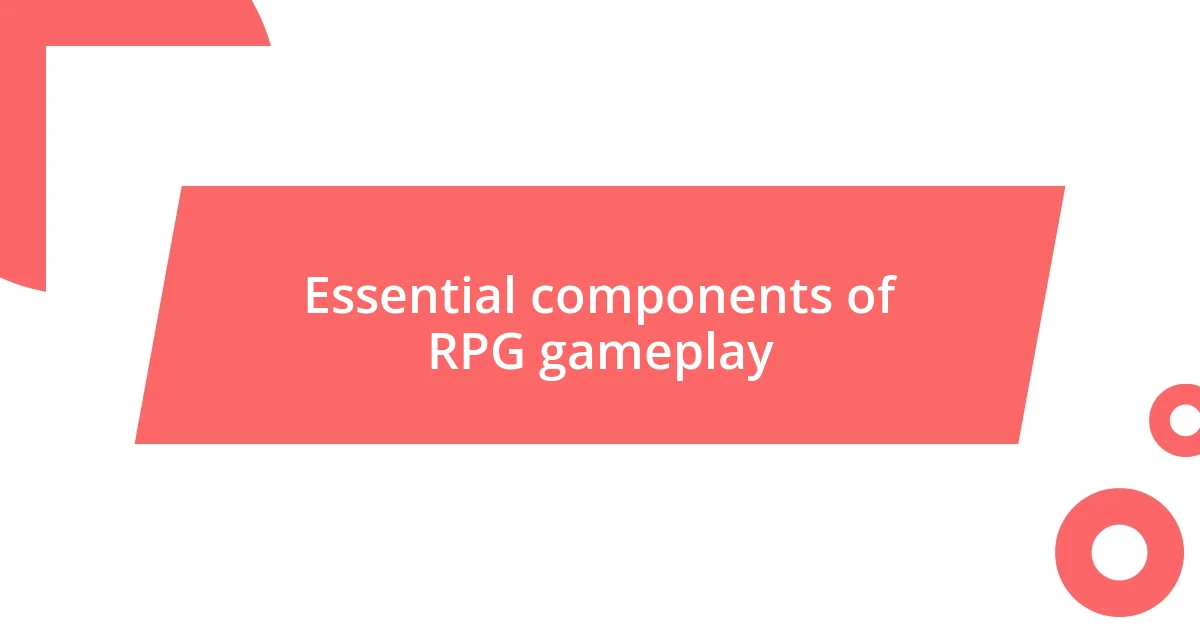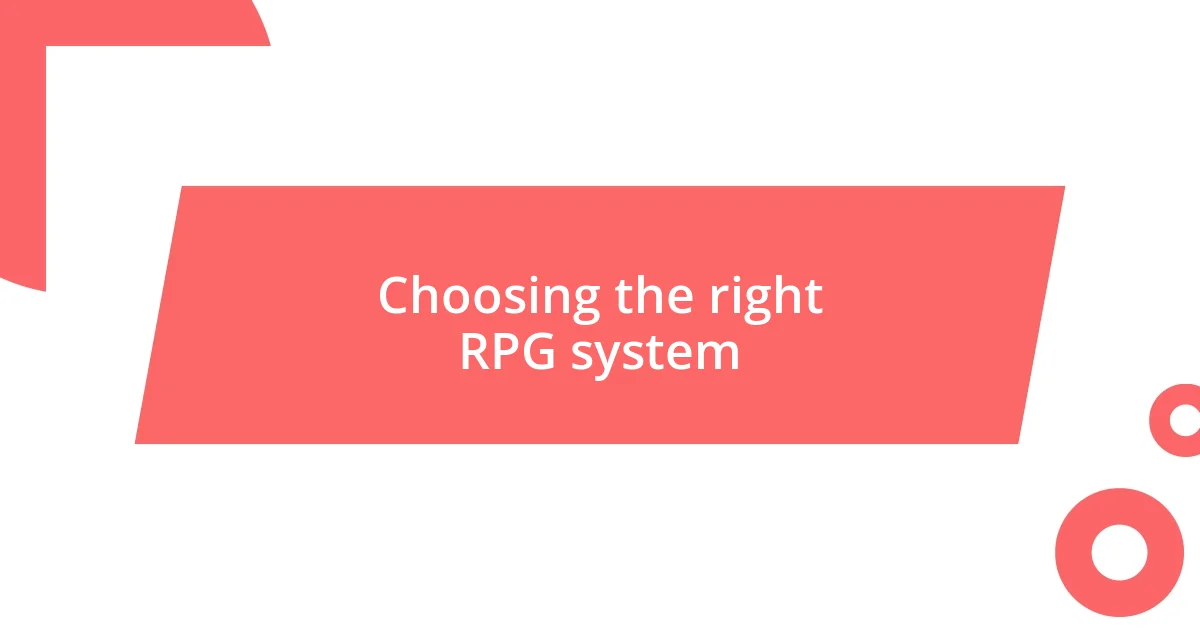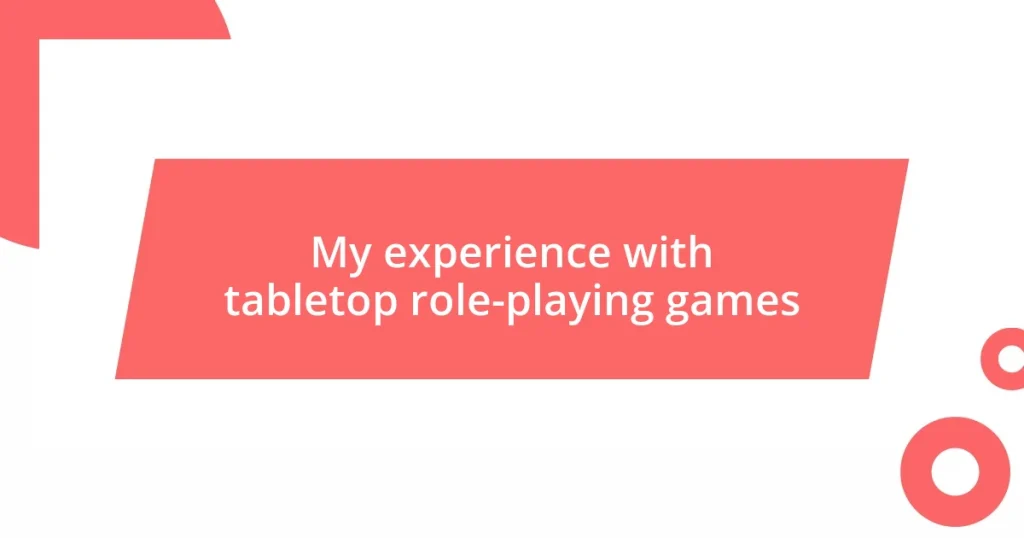Key takeaways:
- Tabletop role-playing games (TTRPGs) foster creativity, storytelling, and social interaction, allowing players to explore diverse characters and face the unpredictability of shared narratives.
- Key components of RPGs include the Game Master, character creation, and the use of dice, all of which contribute to a rich, engaging experience.
- Enhancing gameplay involves creating the right environment, using props and visuals, and incorporating music to elevate player immersion and enjoyment.

Introduction to tabletop role-playing games
Tabletop role-playing games (TTRPGs) offer a unique blend of storytelling, creativity, and social interaction, creating an immersive experience like no other. I remember the first time I sat at a table, dice in hand, my heart pounding with excitement. Isn’t it fascinating how a group of people can come together to weave epic tales and embark on adventures simply by imagining them?
At their core, TTRPGs are collaborative narratives where players take on the roles of characters in a fictional world. I’ve found that stepping into a character’s shoes can be liberating, allowing me to explore different personalities and scenarios that I might not encounter in daily life. Have you ever wished to be a daring hero or a cunning rogue? Through TTRPGs, those fantasies become realities.
What truly captivates me about these games is the unpredictability of each session. Just when I think I’ve anticipated the outcome, a dice roll—or, more often than not, an unexpected decision from a fellow player—turns the story in a new direction. It’s this sense of spontaneity, along with the laughter and camaraderie, that keeps me coming back for more. Do you think you could handle the thrill of an unknown journey? I assure you, once you dive in, there’s no looking back.

Getting started with RPGs
Getting started with RPGs can feel a bit overwhelming at first, but I promise you it’s worth the effort. I recall my initial hesitation—how would I ever grasp the rules and mechanics? What fascinated me was the sense of community I found immediately. It didn’t take long before I was embraced by more experienced players whose guidance made the learning process enjoyable. In those early sessions, the laughter and shared stories transformed my apprehension into excitement.
Here are a few tips to help you embark on your RPG journey:
- Find a group: Look for friends or join online communities. Finding a supportive group makes all the difference.
- Choose a simple game: Some systems are beginner-friendly, like ‘Dungeons & Dragons’ 5th Edition or ‘Fiasco.’
- Character creation: Embrace the character creation process—it’s half the fun! Explore different backgrounds and personalities.
- Ask questions: Don’t hesitate to seek clarity on rules. Most players love sharing their knowledge.
- Be open to improvisation: The beauty of RPGs lies in creativity—let the story evolve naturally.
Embracing these steps turned my initial doubts into an exhilarating adventure, and I’m sure it can do the same for you.

Essential components of RPG gameplay
The essential components of RPG gameplay revolve around several key elements that contribute to the richness of the experience. First and foremost is the Game Master (GM), who guides the story and creates the world in which players embark on their adventures. I remember being a GM for the first time; crafting intricate plots and weaving characters’ backstories felt like painting with words. It made me realize how vital the GM’s role is in shaping the narrative.
Another fundamental component is character creation. Each player crafts their character, choosing traits, backstories, and abilities that influence gameplay. I’ve found that investing time in developing a character deepens my connection to the game. It’s like watching a favorite series unfold; I become invested in my character’s journey. How do the choices you make during character creation change your gameplay? For me, embracing flaws and quirks makes victory even sweeter.
Lastly, the dice serve as a crucial tool to determine outcomes and add an element of unpredictability to the game. The thrill of rolling dice evokes a sense of suspense—will I succeed or fail? I can still feel the rush when I rolled a natural 20, changing the course of the session in an unexpected way. In essence, these components intertwine to create an engaging tapestry of storytelling, strategy, and spontaneity that keeps me enchanted with RPGs.
| Component | Description |
|---|---|
| Game Master (GM) | Guides the story and creates the world for players. |
| Character Creation | Players develop unique characters with distinct traits and backstories. |
| Dice | Determine outcomes and add unpredictability to gameplay. |

Choosing the right RPG system
Choosing the right RPG system can define your entire experience, so it’s essential to find one that resonates with you and your group. I vividly remember my first search for the perfect system; I stumbled upon the myriad options and felt that familiar mix of excitement and confusion. What ultimately helped me was considering what kind of story I wanted to tell—fantasy, sci-fi, or a more narrative-driven journey? Reflecting on your preferences can guide you to the perfect match.
Sometimes, the complexity of gameplay can be daunting. When I was introduced to a more convoluted system, I quickly realized it wasn’t for me. I longed for a balance between depth and accessibility. My advice? Look for systems that offer simplicity in rules while leaving room for rich storytelling. Playing something that allows you to focus on character development rather than memorizing countless mechanics can deepen your engagement and enjoyment.
Don’t underestimate the importance of group dynamics, either. I’ve found that sharing a system with friends who are on the same page makes all the difference. Have you ever played a game where not everyone was invested? It can feel disjointed and unsatisfying. The right RPG system enhances collaboration, encouraging everyone to immerse themselves in the experience. Trust me, picking the right system means everyone at the table gets to shine, and that’s what makes for unforgettable adventures.

Building a memorable character
Building a memorable character begins with embracing their unique traits and flaws. I once played a rogue who was terrified of mice—a silly quirk at first glance, but it ended up creating some of the most humorous and memorable moments in our campaign. Each time a mouse appeared, the tension and laughter around the table were palpable. Doesn’t it feel rewarding when a simple character trait can spark such uproarious fun?
A rich backstory is equally essential for character depth. I remember crafting a backstory for my wizard, where he was the last surviving member of a forgotten order. Diving into that narrative not only gave him a sense of purpose but also shaped the way I played him. The stakes felt higher every time I made a choice, knowing that his past haunted him. What are the stories that drive your characters? Their past has a way of influencing their present and future, creating an engaging narrative for everyone involved.
Integrating personal connections can enhance the character’s memorability as well. I once linked my character’s journey to my best friend’s backstory, creating a bond that motivated us both. When you intertwine your characters’ fates, it elevates the stakes and encourages collaborative storytelling. Isn’t it magical how shared narratives deepen the connections among players? Each session became a blend of our histories, and I still remember those sessions vividly.

Tips for effective role-playing
Embodying your character is crucial for immersive role-playing. I recall an instance during a campaign when I fully inhabited my bard, singing snippets of ridiculous songs and adopting a flamboyant demeanor. The laughter and engagement from my party made it clear that when I leaned into the silliness, everyone felt more invited to join in the fun. Have you tried stepping out of your comfort zone like that? It can transform the overall atmosphere of the game.
Listening is just as vital as acting. I remember a session where a player’s character was deeply emotional about a family betrayal. Instead of waiting for my turn to speak, I leaned in, asked questions, and adjusted my character’s actions to support theirs. This willingness to pay attention formed stronger bonds between us. It’s incredible how taking the time to listen can turn a simple encounter into a meaningful exchange. How often do you actively engage in that way? Embracing those moments can elevate your experience tremendously.
Lastly, don’t shy away from embracing both victory and failure as part of the journey. There was a time when my fearless paladin failed a critical roll while trying to save a village, leading to an unexpected twist in our story. Rather than feeling defeated, I realized we had just opened the door to a subplot that enriched our campaign! What lessons or adventures lie hidden in your character’s missteps? I’ve learned that every failure can lead us to uncharted territory and create some of the best stories to tell.

Enhancing the gaming experience
In my experience, the environment where gameplay occurs can significantly shape the gaming experience. I fondly recall a night spent around a flickering fire pit, with friends huddled together and away from screens. The crackling of the fire created a perfect backdrop for our campaign, immersing us even deeper into our fantasy world. Isn’t it amazing how a simple shift in surroundings can elevate the energy and imagination of the entire game?
Another way to enhance the experience is through the creative use of props and visuals. I once brought in handmade miniatures for my characters, and it transformed how we interacted. Every time I moved my little wizard across the table, I could see my friends’ reactions. It was as if the characters leaped off the page and into our reality! Have you ever thought about how physical representations might influence your group’s dynamic? There’s something undeniably enchanting about making the fantasy tangible.
Lastly, incorporating music and sound effects can also enrich the atmosphere wonderfully. During one unforgettable session, I curated a playlist that matched the themes of our adventure, from suspenseful tracks during a tense battle to whimsical tunes for light-hearted moments. These auditory cues deepened our engagement, making everyone’s heart race or bringing out giggles in perfect timing. What role does sound play in your games? I believe it can shape emotions just as vividly as a vivid description or a captivating narrative.















